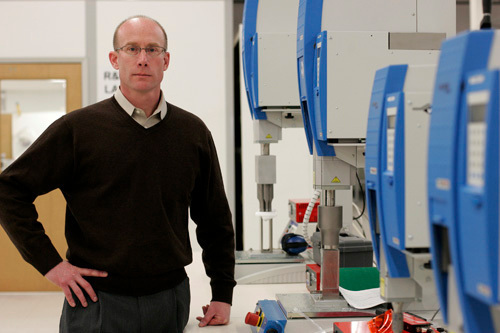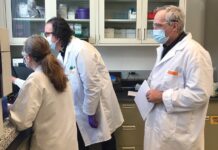
The product development firm Item Group has long been known for its enthusiastic embrace of innovation and new thinking – an adaptability that extends to its own corporate structure.
The Providence-based company was founded in 1985 by two Rhode Island School of Design graduates, Stephen Lane and Aidan Petrie, and over the years Item has worked on everything from baby strollers to hospital equipment.
A few years ago, the founders split Item Group into three subsidiaries, each with a distinct focus: Ximedica (medical products), Item New Product Development (consumer products) and Innovation Chain Partners (private-label retail products). As time went on, however, they found that the focuses of all three units were shifting in the same direction: medical and health care products.
And so the company has decided to reorganize once again, dropping two of the divisions and re-branding the entire operation as Ximedica. (“Item Group is now Ximedica,” the firm’s new Web site declares.) The two founders are still involved, Lane as CEO and Petrie as chief innovation officer.
Dan Reifsteck, who joined Item last year and is now Ximedica’s chief operating officer, said in an interview that the changes occurred as the majority of the company’s business came to be developing medical devices for partners such as Boston Scientific, Davol and DePuy Mitek.
“The different business units were doing more and more health care- and medical-related stuff,” he said in an interview at the 80,000-square-foot building on Dupont Drive that the company renovated two years ago. “So it was really just a matter of doing what the landscape was asking us to do, which is to further refine our focus to be just [on] medical and health care consumer products.”
Despite the recession, Reifsteck says the company plans to grow its business by 20 percent, and expects to increase its staff of 100 workers by up to 10 percent this year.
“We’ve got ambitious goals, and I’m not seeing any reason why we’d be slowing down at all,” he said. “Companies can’t stop product development.”
What Ximedica offers its clients is a one-stop shop for creating new products. Its in-house teams work together throughout the process, from conception and design to manufacturing and regulatory compliance. Reifsteck said that is the key to the company’s detailed quality control system.
“If you let there be a barrier, that will reduce efficiency and effectiveness,” he said, since engineers will have different and sometimes competing priorities compared with regulatory experts. “But if you have a culture that says, you know what, from the beginning you’re going to work together and you are both accountable for the success of this … [then] everybody has buy-in from the beginning, and they have to get it done.”
At the same time, Reifsteck said Ximedica does not want its employees to forget that the work they are engaged in is literally a matter of life and death. “You’re not just making widgets,” he said. “You’re making things that are changing the outcome of people’s lives or illnesses.”
Reifsteck declined to discuss products the company is currently working on, citing client confidentiality.
With the health care industry entering what looks like a period of enormous change, Reifsteck said Ximedica wants to play an active role in bringing about innovations that bolster positive health outcomes and, where possible, reduce costs.
The company already partners with three of the four major stakeholder organizations in medicine – big medical companies, hospital systems and other providers, and benefit- management systems – and eventually wants to work with the fourth – insurance providers – as well, he said. •












